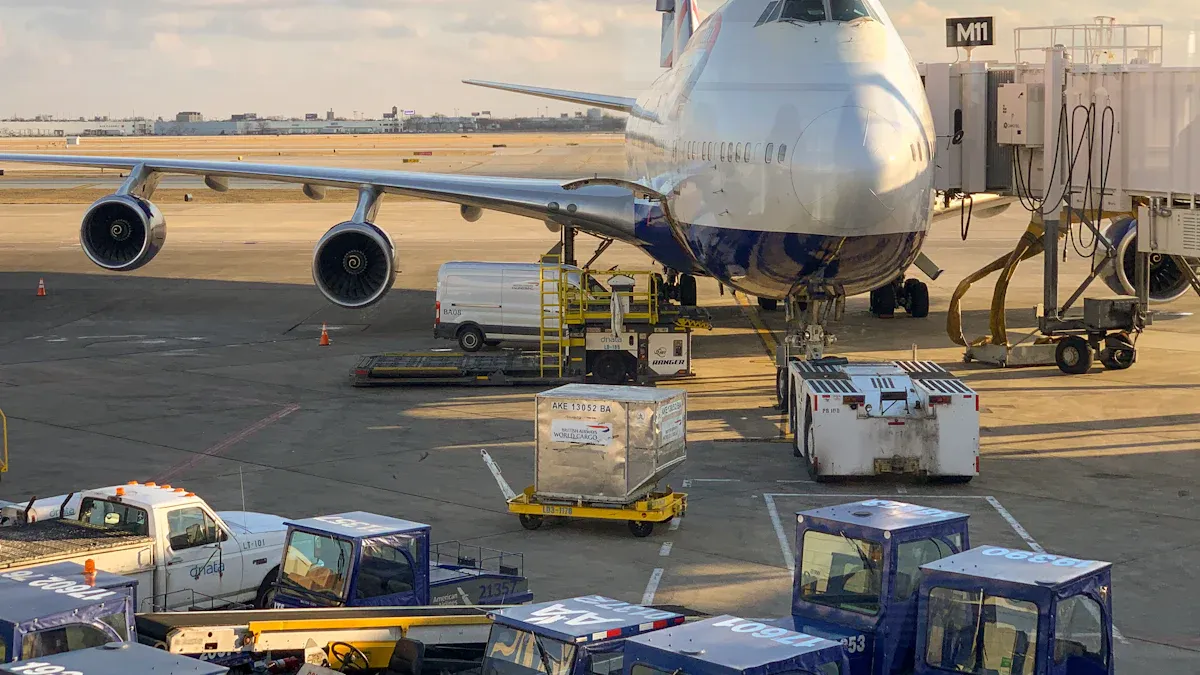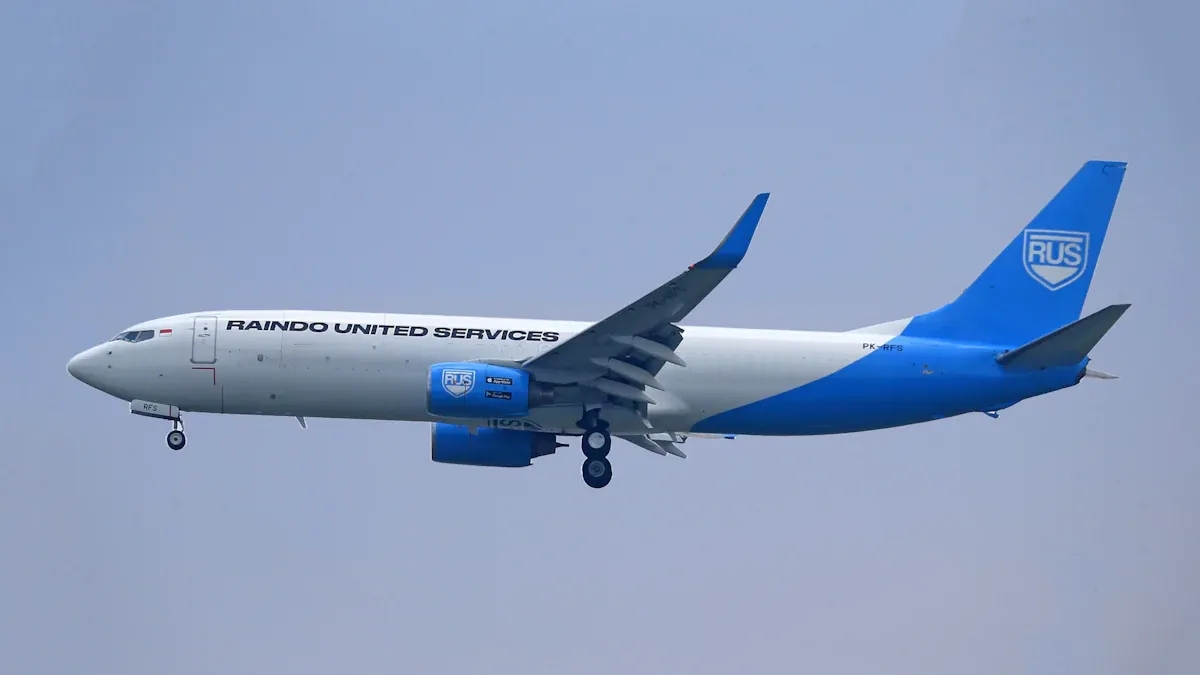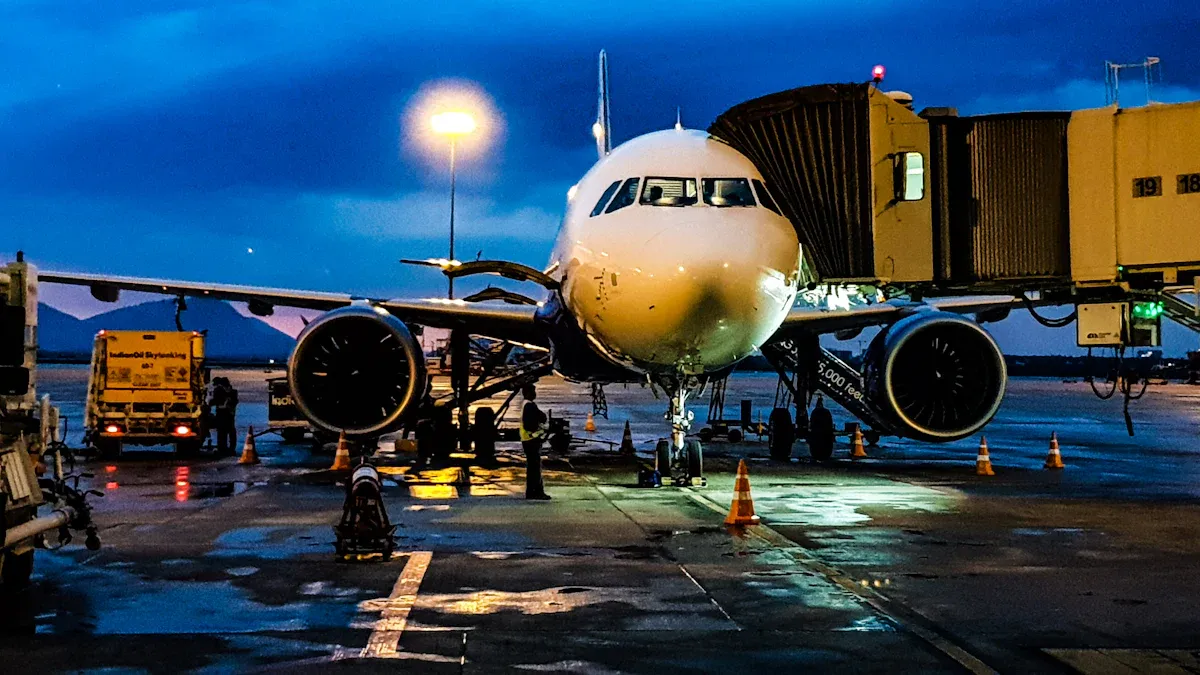How to Ship Goods via Air Freight: Detailed Steps

Air freight offers unmatched speed for transporting goods globally. It ensures delivery within hours or days, unlike road or sea transport, which often takes weeks. In 2022, rising global trade highlighted air freight's efficiency, making it a preferred choice for time-sensitive shipments. Although more expensive due to fluctuating fuel prices, its reliability and rapid transit times make it indispensable for businesses needing to ship goods quickly and securely. Market demand and economic conditions further influence its capacity, emphasizing the importance of strategic planning when utilizing this mode of transport.
Key Takeaways
Air freight is the quickest way to send goods worldwide. It is great for urgent deliveries that need speed.
Learn air freight rules to avoid fines and ship easily.
Pack items well; pick the right box and padding to keep them safe.
Correct paperwork is key for customs; check forms to stop delays.
Pick a trusted shipping company like JUSDA to make shipping easier and faster.
Preparing to Ship Goods via Air Freight

Understanding Air Freight Regulations and Compliance
Compliance with air freight regulations ensures smooth shipping and avoids penalties. Shippers must stay updated on the latest requirements, such as the ACAS Implementation Guide, which mandates new data elements for cargo shipments. The Cargo Descriptions list, issued by US Customs and Border Protection, outlines acceptable and unacceptable descriptions, with enforcement beginning November 12, 2024. Additionally, EXW shipments from Europe to the USA require shippers to establish accounts with freight forwarders for seamless processing.
Regulation/Requirement | Details |
|---|---|
ACAS Implementation Guide | New data elements required for cargo shipments, with updated messaging standards. |
Cargo Descriptions | List of unacceptable vs acceptable cargo descriptions issued by CBP. Enforcement starts November 12, 2024. |
EXW Shipments | Clarification on responsibilities for EXW shipments from Europe to the USA. |
By 2030, compliance systems will evolve into intelligent platforms, enabling real-time monitoring and proactive decision-making. This transformation will integrate compliance into every transaction, streamlining the process for businesses shipping goods globally.
Selecting the Right Packaging for Air Freight
Proper packaging minimizes damage during transit and ensures goods arrive safely. Choosing the correct box size prevents items from shifting, while internal cushioning materials like bubble wrap or foam absorb shocks. Custom packaging solutions enhance protection and improve customer satisfaction, especially for fragile or high-value items.
Evidence Type | Description |
|---|---|
Correct Box Size | Ensures a snug fit for products, reducing shifting and risk of damage. |
Internal Cushioning | Absorbs shocks and prevents scratches and dents, with materials like bubble wrap and foam. |
Custom Packaging Options | Tailored solutions enhance protection and improve customer satisfaction. |
Shock Absorption | Protective packaging absorbs shocks and vibrations, crucial for fragile items during transit. |
Customizable Features | Allows for tailored solutions that minimize movement and enhance safety during shipping. |
Shippers should also consider the weight and dimensions of their packaging, as these factors influence air freight costs. Lightweight yet durable materials can reduce expenses while maintaining product safety.
Preparing Essential Documentation for Air Freight
Accurate documentation is critical for compliance and avoiding delays. Essential documents include:
Commercial invoice: A detailed description of the goods, value, and terms of sale.
Packing list: A comprehensive list of items included in the shipment.
Air Waybill (AWB): The contract of carriage between the shipper and carrier.
Customs declaration: A document detailing the shipment's contents for customs clearance.
Proper documentation ensures smooth customs clearance and facilitates payments. Even minor errors can lead to delays, increased storage fees, or fines. Shippers must double-check all paperwork to avoid complications when shipping goods internationally.
Booking Your Air Freight Shipment with JUSDA
Obtaining Accurate Quotes for Air Freight
Accurate quotes are essential for managing air freight costs effectively. Shippers should provide detailed information about their cargo, including weight, dimensions, and destination, to receive precise estimates. Transparent communication with logistics providers ensures no hidden fees or unexpected charges arise during the shipping process.
Cost-saving strategies can further optimize air freight expenses. For instance, utilizing a Transportation Management System (TMS) or shipping during off-peak times can significantly reduce costs. The table below highlights potential savings:
Strategy/Source | Cost Savings Percentage |
|---|---|
Utilizing TMS | |
Shipping during off-peak times | Up to 25% |
By leveraging these strategies, businesses can allocate resources more efficiently while maintaining the quality of their shipping operations.
Choosing the Right Carrier and Service
Selecting a reliable carrier is crucial for ensuring timely and secure delivery. Shippers should evaluate carriers based on their experience and track record. Experienced forwarders adeptly handle specific cargo types and navigate complex regulations. A strong track record, including high on-time delivery rates and positive customer feedback, indicates reliability.
Experience: Choose forwarders with expertise in handling your cargo type.
Track Record: Investigate on-time delivery rates, safety records, and customer reviews.
“Traditionally, many shippers have analyzed their carriers’ performance for the year to prepare for the next year’s contract negotiations... Shippers can use the information all year round to measure performance more frequently, negotiate updated rates into your contract, and to plan alternative routings, or partner with new carriers to meet new customer demand.”
Partnering with a trusted logistics provider like JUSDA ensures access to a robust network of carriers and tailored solutions for diverse shipping needs.
Scheduling and Confirming Your Shipment Details
Scheduling shipments requires careful planning to avoid delays. Shippers should confirm all details, including pickup times, delivery windows, and transit routes, with their logistics provider. Early scheduling allows for better resource allocation and ensures availability during peak seasons.
JUSDA simplifies this process by offering streamlined scheduling tools and real-time updates. Their advanced systems enable shippers to monitor their cargo and make adjustments as needed. This proactive approach minimizes disruptions and ensures goods reach their destination on time.
By following these steps, businesses can ship goods efficiently while optimizing costs and maintaining reliability.
Introduction to JUSDA' 8 Core Products for Air Freight Solutions
JUSDA offers a comprehensive suite of logistics solutions tailored to meet diverse air freight needs. These 8 core products provide businesses with efficient, cost-effective, and reliable options to ship goods globally. Each product is designed to address specific challenges in the supply chain, ensuring seamless operations.
Air Transport: JUSDA's air freight services focus on strategic route planning and resource allocation. By utilizing Block Space Agreements (BSA) and intermodal transportation, the company ensures timely deliveries while optimizing costs.
Land Transport: This service complements air freight by offering efficient first-mile and last-mile delivery. Specialized vehicles, such as air cushion trucks, enhance safety for sensitive cargo.
Ocean Shipping: For businesses requiring multimodal solutions, JUSDA integrates air and sea freight to balance speed and cost. Consolidated cargo volumes ensure competitive pricing.
Rail Transport: JUSDA promotes cross-border rail solutions, such as China-Europe routes, to provide an alternative for bulk shipments. These services reduce transit times compared to traditional sea freight.
Cloud Warehousing: Advanced warehousing solutions enable real-time inventory management. This feature supports businesses in maintaining stock visibility and reducing storage costs.
Consolidation and Distribution: JUSDA's consolidation services optimize cargo space, reducing shipping expenses. This solution is ideal for businesses with smaller shipments.
Comprehensive Foreign Trade Services: JUSDA simplifies customs clearance and trade compliance, ensuring smooth international transactions.
JusLink Intelligent Supply Chain: This platform leverages IoT, cloud computing, and big data to enhance supply chain visibility. Real-time tracking and predictive analytics improve decision-making.
Note: JUSDA's air freight solutions integrate seamlessly with other transportation modes, offering businesses a flexible and scalable logistics network.
By leveraging these core products, businesses can streamline their operations, reduce costs, and ensure timely delivery. JUSDA's innovative approach to logistics makes it a trusted partner for global trade.
Shipping and Tracking Your Goods

Handover Procedures for Air Freight Shipments
Efficient handover procedures ensure smooth transitions between shippers, carriers, and freight forwarders. Airlines transport over 52 million metric tons of goods annually, representing more than 35% of global trade by value. This equates to approximately $6.8 trillion worth of goods transported each year. Proper coordination during handovers minimizes delays and ensures goods remain secure throughout the process.
Key steps in the handover process include verifying shipment details, inspecting packaging integrity, and confirming documentation accuracy. Shippers must ensure that all required documents, such as the Air Waybill (AWB) and customs declarations, are complete and accurate. Any discrepancies can lead to delays or additional costs. By the end of 2020, cargo tonne-kilometers had returned to near pre-COVID levels, highlighting the resilience of air freight systems despite global disruptions.
Using Tracking Tools to Monitor Your Shipment
Tracking tools provide real-time visibility into the status of shipments, enabling businesses to monitor progress from dispatch to delivery. These tools enhance transparency and help identify inefficiencies in the shipping process. Real-time data access is crucial for optimizing logistics operations, especially in industries like pharmaceuticals and electronics, where precision is vital.
KPI | Description | Purpose |
|---|---|---|
On-Time Deliveries | Percentage of orders delivered on or before the estimated date. | Measures reliability and improves service quality. |
Average Wait Time | Time taken to load cargo into a truck, from entry to exit. | Identifies delays and optimizes carrier costs. |
Order Accuracy | Ratio of orders delivered without damage or customs issues. | Tracks delivery accuracy and enhances transportation safety. |
Average Freight Cost per Tonne Shipped | Cost to ship one tonne of freight, calculated per route and season. | Advises clients on cost-effective routes and trends. |
Shipment Quantum and Capacity Utilization | Percentage of container or truck space utilized. | Reduces space wastage and improves shipping efficiency. |
Air freight forwarding software ensures comprehensive tracking, allowing companies to monitor shipments at every stage. This visibility reduces disruptions and enhances logistics efficiency.
Communicating with JUSDA for Real-Time Updates
Effective communication with logistics providers like JUSDA ensures seamless coordination and timely updates. JUSDA offers advanced tracking systems that provide real-time insights into shipment status. Shippers can use these tools to address potential issues proactively, ensuring goods reach their destination on time.
JUSDA's JusLink Intelligent Supply Chain platform integrates IoT and big data to enhance visibility and collaboration. This platform allows businesses to track shipments, analyze performance metrics, and optimize operations. Monitoring spot quotes and analytics further helps manage costs and identify inefficiencies. By leveraging these tools, businesses can streamline their logistics processes and improve overall performance.
Tip: Regular communication with JUSDA's support team can help resolve issues quickly and maintain smooth operations.
Receiving Your Air Freight Shipment
Clearing Customs and Paying Duties
Clearing customs is a critical step in receiving air freight shipments. Customs authorities review shipment documentation to ensure compliance with import regulations. Shippers must provide accurate details, including the Air Waybill (AWB), commercial invoice, and packing list. Customs officials assess duties and taxes based on the declared value and classification of goods. Paying these fees promptly avoids delays and additional storage charges.
Customs agencies, such as the CBP (Customs and Border Protection) in the United States, use advanced data analysis to identify potential risks. They analyze cargo data in advance to target high-risk shipments for inspection. This proactive approach ensures the safety and compliance of goods entering the country. Businesses should work closely with their logistics provider to navigate customs procedures efficiently.
Arranging Final Delivery to Your Destination
After clearing customs, arranging the final delivery ensures the shipment reaches its destination. Timely and accurate deliveries significantly enhance customer satisfaction. Advanced technologies, such as route optimization, improve delivery efficiency and reliability. Flexible delivery options cater to diverse customer needs, fostering loyalty and trust. Real-time tracking tools provide transparency, allowing recipients to monitor their shipment's progress.
Logistics providers like JUSDA offer tailored solutions for final delivery. Their services include specialized vehicles for sensitive cargo and efficient last-mile delivery options. By leveraging these capabilities, businesses can ensure a seamless delivery experience.
Inspecting and Verifying Your Shipment Upon Arrival
Inspecting shipments upon arrival ensures the goods meet quality and compliance standards. Effective inspection protocols include physical checks, X-ray scanning, and chemical analysis. These methods detect potential issues, such as damage or hazardous materials, before the goods are distributed.
Inspection Protocol | Description |
|---|---|
X-ray scanners | Check container contents for illegal or dangerous items. |
Radiation detection systems | Identify nuclear materials or hazardous substances. |
Physical inspection | Manually or automatically verify cargo compliance. |
Chemical analysis | Detect harmful substances that pose health risks. |
The TSA (Transportation Security Administration) mandates 100% screening of international air cargo on passenger aircraft. This ensures the safety and integrity of shipments. Businesses should document any discrepancies during the inspection process and report them to their logistics provider for resolution.
Tip: Always verify shipment details, including quantity and condition, to avoid disputes or delays in processing.
Shipping goods via air freight demands meticulous planning and precise documentation. Businesses must stay informed about regulations and select dependable logistics partners to avoid disruptions. JUSDA offers comprehensive solutions that simplify the process and ensure efficiency. By following the outlined steps, companies can streamline operations and achieve timely deliveries. Leveraging JUSDA's expertise allows businesses to navigate challenges confidently and maintain a competitive edge in global trade.
Tip: Regularly review air freight regulations to stay compliant and avoid unexpected delays.
FAQ
What is the difference between air freight and express shipping?
Air freight focuses on bulk shipments and offers flexible delivery options. Express shipping prioritizes speed for smaller packages, often using dedicated networks. JUSDA provides tailored solutions for both, ensuring timely and cost-effective deliveries.
How does JUSDA enhance shipment tracking?
JUSDA uses advanced tools like the JusLink Intelligent Supply Chain platform. This system integrates IoT and big data, offering real-time tracking, predictive analytics, and performance insights. Businesses gain full visibility into their shipments from dispatch to delivery.
What industries benefit most from air freight services?
Industries like electronics, medical supplies, and automotive rely heavily on air freight for time-sensitive shipments. JUSDA specializes in serving these sectors, offering customized solutions to meet their unique logistics needs.
Tip: Consult with JUSDA's experts to identify the best air freight options for your industry.
See Also
Discovering Top Global Logistics Firms: A Comprehensive Overview
Exploring Innovations in Sea Freight Logistics for 2024
Mastering Cost Reduction Strategies in Logistics Management
Overcoming Automotive Supply Chain Hurdles: Insights from Experts
Achieving Success in High-Tech Manufacturing Through Lean Logistics
